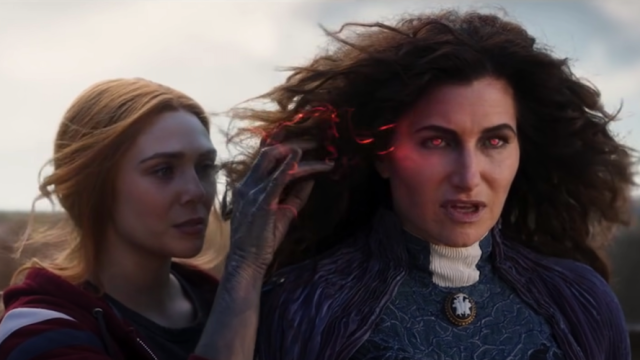When Marvel’s WandaVision rhetorically asked “Who’s been messing up everything?” in its seventh episode, the answer was as obvious as it was catchy. But by the series finale of the Disney+ series, the answer had become considerably more complicated, in no small part because of how densely packed and at times overstuffed the episode felt.
Agatha Harkness very quickly became WandaVision’s closest thing to a big bad supervillain, but in the finale, the parasitic elder witch said a few things that made it somewhat unclear as to exactly where WandaVision was placing responsibility for what happened in Westview. Much as Agatha very explicitly took credit for all of WandaVision’s mischief while hamming it up to the camera during “Agatha All Along,” Agatha and Wanda’s journey into the Scarlet Witch’s mind made it quite clear that Wanda was uncontrollably working hexes long before she and Agatha ever crossed paths.
[referenced id=”1676463″ url=”https://gizmodo.com.au/2021/03/now-that-wandavisions-said-the-scarlet-witchs-name-heres-what-it-means/” thumb=”https://gizmodo.com.au/wp-content/uploads/2021/03/03/byvf2578auuvu8v1iobi-300×169.jpg” title=”Now That WandaVision’s Said the Scarlet Witch’s Name, Here’s What It Means” excerpt=”In the final moments of WandaVision’s most recent episode, the name that’s been on everyone’s mind ever since Wanda Maximoff first showed up in Captain America: The Winter Soldier’s post-credits sequence was spoken.”]
In a recent interview for Empire Magazine’s film podcast, WandaVision creator and showrunner Jac Schaeffer reiterated how, at one point early in the show’s production process, the possibility of Agatha acting as more of a mentor to Wanda as she often is in the comics was briefly considered before it was ultimately decided that the character would work better as a villain. Agatha taking credit for Wanda’s impressive feats of chaos magic fits with the show’s framing of her as a manipulator, but Schaeffer explained that it was important to her that there was a substantial amount of truth to the essence of Agatha’s words to her fellow witch.
“She’s just messing with things, like, she’s not actually responsible for anything,” Schaeffer said of Agatha. “She does some things with the kids and Vision, and she’s kind of nasty, but the majority of the things that she says to Wanda are true and correct, and she’s right. Heroes don’t torture people.”
Strong as WandaVision was for the most part up until its final episode, the way the story’s internal complexity was meant to be a reflection of Wanda’s own disjointed, chaotic emotional states sometimes got lost in the mix of things. That was especially true in moments that were designed to make you guess which villainous comics characters might be hiding in plain sight. Despite all the red herrings, though, Schaeffer still sees WandaVision as a story that illustrates why the power Wanda wields also comes with a high level of responsibility.
“It was important to us that it be all Wanda and that it would be her responsibility because we didn’t want — we weren’t doing Mephisto, Nightmare, the Grim Reaper, or any other people or entities,” Scheffer explained. “If we’re not going to take the cheap way out that there’s this other force, right, if we’re going to give the gift of storytelling to Wanda, I give the whole power, she also then has the culpability and has the accountability.”
Out of all of WandaVision’s twists, Pietro’s “recasting” caused some of the biggest buzz because of all of its implied significance about the possibility of a future MCU filled with mutants. “Fietro,” Schaeffer explained, was always meant to be a major meta-joke crafted to poke fun at the audience every bit as much as it alarmed Wanda herself the minute her ersatz brother showed up on her doorstep. Beyond the obvious gag of it all, though, a fair amount of thought went into how actual grieving people sometimes struggle with fears about how they’ll remember their lost loved ones.
“We had a grief counselor come to the [writers] room, and we did some research on grief, and there’s a lot about how people remember faces,” Schaeffer recalled. “The anxiety of not remembering the faces of your loved ones, misremembering, or actively misremembering things as a self-preservation tactic — all of that became fascinating to us, and we thought that by casting Evan [Peters] in the role, it would not only have that effect on Wanda, but it would have this meta layer for the audience, as well.”
To Schaeffer’s mind, WandaVision saw the Avenger become a wife, mother, and showrunner of her very own reality, all the while subconsciously allowing herself to be gaslit in a way that belied the power she held. That ended up being one of the most unsettling things about how WandaVision left its titular witch as she flew off to chill in a cabin in the woods with her new book of spells. When next the widow Maximoff shows up in the MCU, there’s little doubt she’ll have all sorts of new levels of defences thrown up specifically to make sure that she never runs into another Westview situation again. With her being the fated harbinger of the apocalypse, though, no matter what she does next, it’s likely to cause quite the fuss.
WandaVision is now streaming on Disney+. We’ll see Elizabeth Olsen’s Scarlet Witch next on the big screen in Doctor Strange in the Multiverse of Madness.
